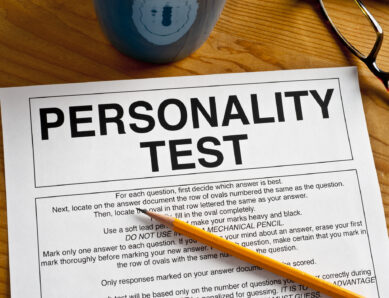A century ago, the military asked the American Psychological Association to develop a test capable of identifying soldiers susceptible to shell shock. Rorschach inkblots then came on the scene, followed by dozens of personality assessments.
The best known of these tests was the Myers-Briggs Type Indicator (MBTI), which classifies personalities as Extrovert-Introvert, Intuitive-Sensing, Thinking-Feeling, and Judging-Perceiving. A couple of years later, William Marston developed the DISC system, classifying one’s dominance, influencing, steadiness, and compliance. By the 1960s profiling established the Big Five model of assessing openness, conscientiousness, extraversion, agreeableness, and neuroticism.
The proliferation of so many systems, as you may have guessed, indicates that none were sufficiently reliable. To the dismay of the military and employers, personality profiles yield a very low correlation between predictive and actual success on the job.
Critics cite the tests’ lack of reliability. Take the test again in a few weeks and your profile is often very different. Another complaint is that forcing test-takers into binary choices ignores that many people embody both characteristics. Moreover, the intent of test questions is highly predictable: job candidates can deduce the desired characteristics of a job, and then simply answer the questions to yield the appropriate profile.
Despite these faults, the use of personality profiling skyrocketed in the early 1970s, when the U.S. Supreme Court outlawed the use of lie detectors in the workplace. Today, more than 4 million people a year take the MBTI. Psychologist David Pittenger claims that this is the result of “the beguiling nature of the horoscope-like summaries of personality and steady marketing.”
The word “personality” comes from the Greek persona, or mask. Dr Alex Lickerman points out that “personality is easy to read, and we’re all experts at it. We judge people funny, extroverted, energetic, optimistic, confident – as well as overly serious, lazy, negative, and shy – if not upon first meeting them, then shortly thereafter,” unless, of course, the personality we’re shown is a mask. The simple fact is that we all employ masks to be as effective as possible in any given situation or social setting.
An executive once told me, “People can hide their true self for about six weeks but, eventually, it emerges.” I have found this timeline to be accurate, but six weeks of hiding is enough for a skilled Masked Man to pass through pre-hire screening.
Let’s go back and ask: Why was the lie detector so popular before it was made illegal? I contend that it was so successful because it measures character. Unlike personality, character traits, such as honesty and virtue, are not immediately felt. Character reveals itself only in specific, and often uncommon, circumstances. And a job interview is the least likely time that a person will allow undesirable character traits to emerge.
Dr Lickerman adds this caution: “If someone is outgoing, confident, and fun, we’re more likely to think they’re honest, moral, and kind. But it’s far from clear that the one kind tracks with the other.” This is reflected in author W. Somerset Maugham’s advice, “When you choose your friends, don’t be short-changed by choosing personality over character.”
Am I dismissing the entirety of personality testing? Oh no! I emphatically endorse them for self-study. It helps us identify which of our traits are mainstream and which are more “outlier.” This helps us understand our strengths and weaknesses, and allows us to improve relations with others.
Profiling claims success in constructing effective teams, but I am troubled when I hear practitioners express diametrically-opposed goals. Many say they seek diversity in teams, but there is scant data in support of diverse personalities improving team effectiveness. Others seek diversity’s opposite – uniformity – in alignment with their organization’s values and culture. But aren’t values and culture reflections of character rather than personality?
What tools are effective for employment screening? Behavioral testing puts task-takers into hypothetical situations that can reveal character. When these tests are interactive, the tester can learn about personality as well as character. Lie detectors may be illegal, but two other tools are now accepted and widely used – internships and temporary employment through a contract-labor company. Each allow an organization, without the liabilities incurred with full-time employment, to observe people beyond the six-week mark to see their true-self emerge.





Comments
peter whiteley says
10 years ago"Personality" is a scientifically established and classified characteristic. "Character" is not. Much misunderstanding about Psychometrics in the minds of non professionals and this sort of sloppy coverage doesn't help. The current guidance for use of registered "personality" tests usually presents them as merely supplementary to other elements of the selection decision supported by "Assessment Centres", Interviews, Demonstrations of skills in action (e.g. Teaching), group exercises, references, CV's, and so on, dependant upon the type of decision being taken.
Long established research showed that on their own, Tests, Assessment Centres and personal history are poorly predictive. The most predictive for skills is a demonstration but even this was only a maximum of 60% predictive. Interviews, used so widely, are always no better than 28% predictive, and tests on their own vary a lot, but usually end up around 40 % predictive. Nevertheless different cultures stick rigidly to their own dogmas regardless,
The French for example employ widespread use of "handwriting style" which is )0% predictive. Many far and Middle Eastern countries and cultures use "star signs" and astrology which is again, in scientific terms 0% predictive. Most of Northern Europe uses the interview, often very badly, with accuracy as stated earlier.
Also, Diversity has little or nothing to do with team effectiveness, only of political expediency. The best examples of high performing role mixes in teams are indicated by old models like "Belbin's team roles in conjunction with the most well regarded personality tests, (Cox P., 1990's , UK)and some form of "action learning" (Revans) or similar behaviourally observed team activites. These hypothesise a variety of roles and types in the best performing teams. Many old fashioned models are more scientifically valid, and robust statistically and behaviourally than many more recently concocted tests and methods. When extended into the learning filed the mess proliferates. NLP Neuro Lingustic Programming is one of the most popular academically unsubstantiated sets of ideas around.
While Ph.D's need to be controversial thus generating many unsubstantiated theories, and many private commercial companies and others leap on the backs of these half baked ideas for their own interest, this will go on. Please be more scientific though.
Mika says
10 years agoPeter, I think the writer echoed many of your sentiments. For instance, he says that "there is scant data in support of diverse personalities improving team effectiveness." - much in line with your comment that diversity has nothing to do with team effectiveness.
I also didn't get the idea that he touted tests as a 100% sound method to learn more about people. He did say though that they're good for self-study - and I agree.
If a test is only 30% of 40% accurate, it can help me to learn a little more about me; myself in relation to others or others in relation to me. Maybe it will bring about only a 5% improvement in my relationships with others, but even 5% makes a difference.
Overall I enjoyed reading the blog and I think the writer made a few very interesting points.
Bruce Murray says
10 years agoPeter, I value your heartfelt response. There’s insufficient room to respond to each of your points, but I hope that I capture their essence: “character” is not scientifically recognized. I defer to your expertise in this matter, but hope you grasp its importance to employers. I suspect that it’s cultural differences that keep us from a common understanding of the nature of character.
Personality-testing is one tool in an insufficient toolkit. The test-makers’ marketing expertise is undeniable and I share your disdain for those who “stick rigidly to their own dogmas,” using such tests as the last word. I also share your point that “demonstration” is the best predictive tool available to potential employers and I outline some effective techniques.
Mika’s comment below captures my point: that personality tests are good for a person’s self-study; beyond that, don’t overvalue them. I think we both agree that the scientific community is still a long ways away from establishing an ideal tool for identifying best candidates for any position.
Finally, you close with a critique of diversity as a team-effectiveness builder. The only point I raise about diversity is that that some employers seek it, while others intentionally avoid it, in their use of personality testing to build teams. It’s clear that practitioners are struggling with establishing “best practices” in these important areas.
Laura Catalina says
10 years agoI appreciate the effort of writing an article but I would like to see at least one scientific or professional (in term of organizational psychology or personality assessment theory) reference on this subject. MBTI isn't a good example, either Rorschach. There are more accurate Personality Inventory such as CPI or NEO-PI-R and a good selection tool (in terms of structured or in depth interviewing, assessment center, personality, cognitive assessment etc.) starts with a Job / Work Analysis so it is a lot to talk on this theme.
I recommend a good reading Adrian Furnham
Good luck and be more careful with documentation process.
Jarrett Masuyama says
8 years agoThat is a good tip especially to those new to the blogosphere. Simple but very precise information… Appreciate your sharing this one. A must read post!
Midgie Thompson says
8 years agoThanks for that feedback Jarrett.